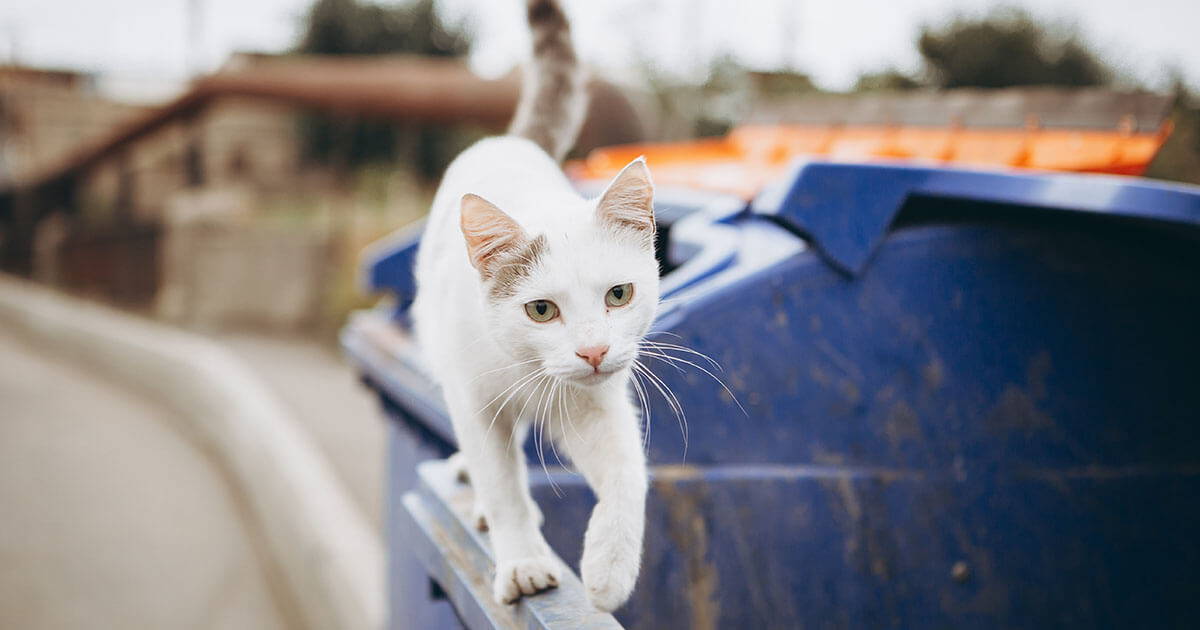Stray cats meow at night primarily to communicate. They may be seeking mates, displaying territory, or expressing needs such as hunger.
Stray cats are often most active during the night, making the darkness a time for vocal announcements. These feline communications can serve several purposes. A meow can be a call for attention, signaling other cats or humans that they require assistance, food, or companionship.
It’s a way of establishing their presence or reaching out to potential mates during the breeding season. The still of the night amplifies their calls, ensuring they carry far distances and reach the intended audience. Understanding the various reasons behind this nocturnal chorus can shed light on the secretive lives of these independent animals, and remind us of the complex social structures that govern their behavior even without a home to call their own.

Credit: www.washingtonpost.com
The Midnight Chorus
The Midnight Chorus is not a term for a band you haven’t heard of. It’s the symphony of meows you may hear when the moon is high. Stray cats often serenade the night. But why do they sing such a nocturnal opera?
Cats As Nocturnal Creatures
Cats possess natural instincts that align with the night. Their ancestors were predators after dark. Modern stray cats continue this tradition. They roam and hunt when it’s dark. They see well in low light. They become very active. This activity includes vocalization.
Communicating Through Vocalization
Cats have different meows for different messages. They may want attention or food. They could be warning other cats. Meows also find mates. At night, these messages fill the air. Hence, the ‘midnight chorus’ starts.
Cats meow more at night for specific reasons:
- Mating calls: Particularly loud, these calls attract mates.
- Hunting success: Prey is active at night, prompting excited meows.
- Establishing territory: Cats declare their presence to others.
- Socializing: Stray cats often interact verbally under the cover of darkness.
Sounds vary too. From short ‘mews’ to long ‘howls’, each has meaning. Sometimes, a cat may simply be stuck or want to come inside a warm house.
| Type of Meow | Possible Meaning |
|---|---|
| Short ‘Mew’ | Request for attention or food |
| Long ‘Howl’ | Mating call or territorial message |
Loud meows pierce the quiet night. Soft purrs echo faintly. Felines communicate, hunt, and exist in the moonlight. Understanding their ‘midnight chorus’ enriches our appreciation for these independent creatures.

Credit: www.hihonor.com
Reasons Behind The Nighttime Serenades
Night falls, and the stray cats in the neighborhood spring to life. Suddenly, the silence breaks with their distinct meows. But why do these feline friends insist on meowing under the moonlit sky? Let’s explore the captivating reasons why stray cats turn into nocturnal singers.
Territory And Mating Calls
Cats use vocal signals to communicate with each other. Stray cats are no different; they declare their presence to other cats. This helps keep other cats away from their claimed areas. As for unneutered males and unspayed females, their calls serve a special purpose. They announce their availability to potential mates.
Search For Food And Attention
Strays often rely on the generosity of humans for food. They learn that meowing can lead to a meal. This behavior is especially true at night when the competition for resources is less fierce. A meow can attract attention from a friendly human who might offer a tasty treat.
Stress And Disorientation
Living on the streets is tough for cats. Noises, unfamiliar smells, and threats can cause stress. Disoriented or older cats may meow more because they’re seeking comfort or assistance. This is their way of calling out for help or to find their bearings in their constantly changing environment.
Deciphering The Meow
Deciphering the Meow: Why do stray cats meow at night?
Nighttime often brings a chorus of stray cat meows. Cats vocalize for many reasons. Hunger, attention, or even the call of the wild are behind these meows. Understanding cat communication helps us respond to their needs. Let’s explore the language of cats together.
Variations Of Feline Noises
Cats make more than just meows. Each sound serves a unique purpose. The various tones range from high-pitched cries of hunger to guttural murmurs signaling fear. Recognizing these sounds aids in comprehension.
- High-pitched meow: Often a call for attention or food
- Chirps and chatters: Linked to hunting behavior or excitement
- Purring: Can be a sign of contentment or pain
- Hissing or growling: Indicates a threat or discomfort
What Different Meows Signify
Cats meow in different ways to express specific needs or feelings.
| Type of Meow | Significance |
|---|---|
| Short Meow | Greeting or a casual ‘hello’ |
| Multiple Meows | Excitement or happy to see someone |
| Mid-Pitch Meow | A plea for something, possibly food or water |
| Long, Drawn-Out Meow | Demand for something urgent like attention or entry to a room |
| Low-Pitch Meow | Complaint or displeasure |
| High-Pitch Meow | Pain or distress |
Human Interaction And Its Impact
The night-time cries of stray cats can puzzle and even disrupt humans. Human interaction plays a significant role in stray cat behavior, especially during the nocturnal hours when these felines are most active. Understanding why stray cats meow at night requires a look at our influence on their daily lives.
Feeding Habits and DependencyFeeding Habits And Dependency
Feeding stray cats can create a dependency that leads to regular visits and vocalizations at night. Cats quickly learn where they can find food and may meow to remind people of this nightly appointment.
- Leftovers attract strays
- Consistent feeding leads to routine howling
- Strays remember generous spots
Influence Of Urban Living On Stray Cats
City life impacts stray cats’ survival strategies. Urban environments present unique challenges and resources for stray cats, influencing their vocal patterns. Bright lights and human noises can make strays more vocal at night.
| Urban Factor | Impact on Stray Cats |
|---|---|
| Loud Noises | Increased meowing to communicate over disturbances |
| Bright Lights | Disrupted sleep patterns leading to more nighttime activity |
| Abundant Shelters | Cats gather and vocalize to establish territories |
Managing The Nocturnal Meowing
Managing the Nocturnal Meowing can be puzzling. Stray cats are often more active at night. Understanding why they meow and how to handle it is crucial. This can mean the difference between a peaceful night’s sleep and a noisy one. Let’s explore how to address these nighttime cries effectively and determine when professional help is necessary.
Effective Responses To Nighttime Cries
Stray cats meow for various reasons at night—hunger, seeking attention, or mating calls. Here are some tips:
- Feed them before dusk to prevent hunger cries.
- Ignore the meowing to avoid reinforcing the behavior.
- Provide a shelter to reduce the need for attention-seeking meows.
These simple steps can reduce the frequency and volume of their vocalizations.
When To Seek Help For Stray Cats
Some meows signal distress. Recognizing the signs is important:
- Continuous, loud meowing could mean injury or illness.
- Change in meow pattern suggests discomfort or fear.
Contact local animal rescue if you notice these signs. They can provide medical care or a safe environment. Caring for stray cats benefits the entire community.
Concluding Insights
‘Concluding Insights’ shines a light on nighttime feline behavior. Cats make sounds for many reasons. We now explore those reasons, and how we can live in peace.
Cats communicate in various ways, including meowing. Stray cats meow at night often due to hunger or seeking mates. They may also meow to establish territory or because they feel threatened. Recognizing these behaviors can help us understand their needs.
To coexist peacefully with stray cats, we can take small steps. Providing food and water, or creating safe shelters, reduces nighttime meowing. Neutering helps control the stray population. These actions create a better environment for both cats and humans.
- Listen: Understand meows as cat communication.
- Observe: Watch for patterns to determine their needs.
- Act: Take steps to address those needs responsibly.

Credit: www.washingtonpost.com
Frequently Asked Questions On Why Do Stray Cat Meow At Night
Why Is A Stray Cat Meowing At My Door At Night?
A stray cat may meow at your door at night seeking food, shelter, or attention. It could also be in heat or signaling distress.
What Does It Mean When A Stray Cat Keeps Meowing?
A stray cat meowing persistently might be hungry, seeking attention, or in distress. It could also indicate the cat is ready to socialize or needs help.
What Does It Mean When A Cat Meows Loud At Night?
A cat meowing loudly at night often indicates hunger, stress, seeking attention, or a mating call. It can also mean that the cat is experiencing discomfort or health issues.
Why Do Cats Sound Like Crying Babies At Night?
Cats may sound like crying babies at night due to their vocalization patterns, which include meows and yowls. These sounds can mimic a baby’s cry and are often used to communicate with humans or express discomfort, desire, or territorial presence.
Conclusion
Understanding the nightly calls of stray cats can deepen our empathy for these independent felines. Their meows serve vital communication and survival purposes, positioning them in the nocturnal urban landscape. By recognizing their needs, we can coexist more peacefully. Let’s listen with care and respond with kindness to our feline neighbors after dark.

